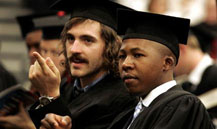Latest News Archive
Please select Category, Year, and then Month to display items
19 November 2018
|
Story Charlene Stanley
|
Photo Charlene Stanley
 Prof John Mubangizi, Dean of the Faculty of Law, encouraged delegates at the Fifth Annual International Mercantile Conference to share ideas on best international practice in their various fields.
Prof John Mubangizi, Dean of the Faculty of Law, encouraged delegates at the Fifth Annual International Mercantile Conference to share ideas on best international practice in their various fields.
“Don’t say anything online that you wouldn’t want plastered on a billboard with your face on it.”
This famous quote by international tech expert Erin Bury should be a guiding light when it comes to online habits in the workplace, according to Francois Cilliers, UFS Lecturer in Mercantile Law.
In his presentation Could Social Media be the Gateway to Employment Discrimination? he warned that employees have a responsibility not to bring their employers in disrepute through their comments on social media.
“Posts, updates, tweets, and comments are considered to be publications and can therefore never be seen as privileged information,” he explained.
Responsibility on employees and employers alike
He pointed out that employers also had a responsibility regarding the way in which they use the information about prospective employees obtained via social media.
“Nowadays, approximately 75% of companies hire through social media. In the US, recruiting companies spend hours researching candidates, making full use of what they can find on social media. It was found that 50–80% of employers frowned upon posts and pictures featuring drug and alcohol abuse, profanity, and bad grammar.”
He warned that employers needed to tread lightly, as a decision not to employ someone as a result of information on the prospective employee’s political views and sexual orientation could constitute unfair discrimination as set out in the Employment Equity Act.
“An employer who wishes to use a screening process (utilising social media) has to prove that the information and the process is objectively necessary and can be justified with reference to the inherent requirements of the job,” he explained.
“As technology and electronic systems advance, so too should the applicable labour laws.”
Cilliers’ presentation formed part of the Fifth Annual International Mercantile Law Conference recently hosted by the Faculty of Law on the Bloemfontein Campus.
Incorporating new technology in teaching and research
“This conference is an opportunity to share ideas on best practice in what is perceived as a ‘difficult’ field within Law,” said Prof John Mubangizi, Dean of the Faculty of Law, as he opened the proceedings. Topics in the discussion sessions ranged from Racism in the workplace and The underrepresentation of females in the judiciary, to Decriminalisation of cannabis: A recipe for healthy employer-employee relations?
“Conferences such as these help us to take advantage of the newest developments in technology to advance our teaching and research,” said Prof Mubangizi.
“To quote Einstein: ‘We can’t solve problems by using the same kind of thinking we used when we created them.’”
Students hard work rewarded at Spring Graduation ceremony
2012-09-17
 |
Photo: Johan Roux
17 September 2012 |
More Kovsies’ hard work will be rewarded this month with 632 qualifications to be awarded at the Spring Graduation ceremony of the university on 20 September 2012. A total of 530 baccalareus and honours degrees and 102 diplomas and certificates will be awarded in Callie Human Centre on the Bloemfontein Campus.
The university awarded more than 4000 qualifications this year – most of which were awarded at the Autumn Graduation ceremony. A total of 629 diplomas and certificates and 2856 degrees were awarded in March 2012 and 481 master’s degrees and 82 doctorates in June 2012.
This month’s qualifications will be awarded at two ceremonies.
The programme for the respective ceremonies is:
- 10:15 the Faculty of Economic and Management Sciences will award 132 qualifications, the Faculty of Health Sciences 80 qualifications and the Faculty of Natural and Agricultural Sciences 146 qualifications.
- 15:15 the Faculty of the Humanities awards 160 qualifications, the Faculty of Education 89 qualifications, the Faculty of Law 20 qualifications and the Faculty of Theology five.